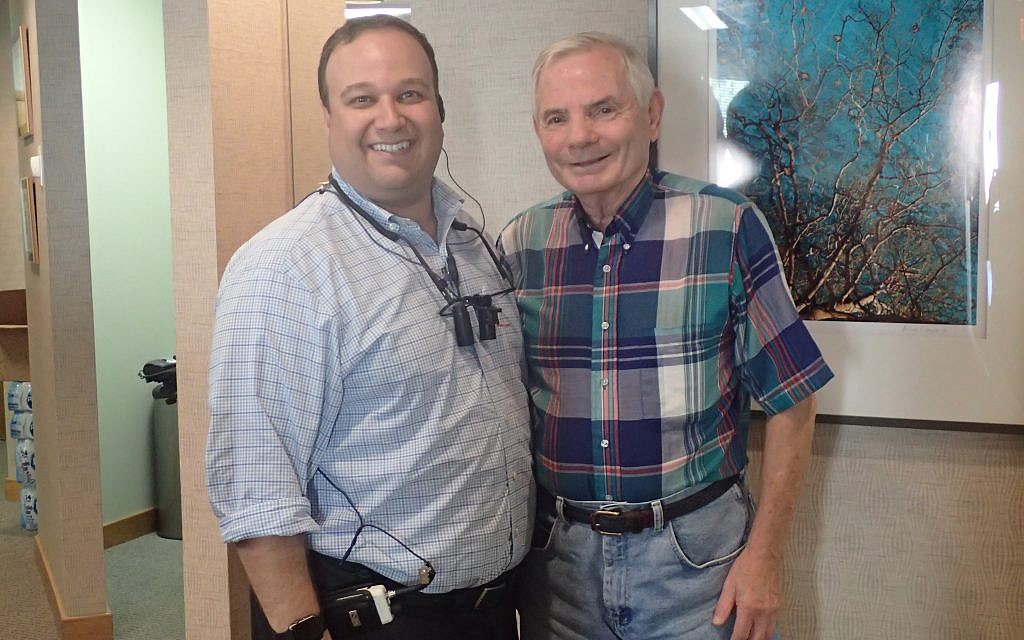Something to Smile About
Dentist Michael Friedman uses his profession to treat Holocaust survivors pro bono.
Dentistry has run in Michael Friedman’s family for decades. His grandfather was a dentist and his great-grandfather before him. Today, Friedman uses his profession to treat Holocaust survivors pro bono.
President of the Atlanta alumni chapter of the Jewish dental fraternity Alpha Omega for the past two years, Friedman discovered the Henry Schein Cares Holocaust Survivors Oral Health program. The public-private partnership, established in 2015, has been providing oral health to Holocaust survivors internationally.
HSOH started with nine U.S. cities and has since expanded to 21, including Atlanta.
Get The AJT Newsletter by email and never miss our top stories Free Sign Up
The program was designed to help aging Holocaust survivors who needed treatment with the goal of providing functional and pain-free smiles, Friedman said.
“They may not have been needy people in the community, but as they aged and got older, Holocaust survivors realized that their finances were diminishing and found themselves in need of sometimes significant costs of dental care,” said Friedman of My North Atlanta Dentist.
“We find that a lot of patients escaped Europe and ended up in the former Soviet Union before coming to the United States. So, we find them having Russian dentistry as well as older dentistry from Eastern Europe.”
Yet each patient’s case is different, Friedman added. “We have seen people who just need a few fillings to people who have not been able to afford care and may need some bad teeth taken out and some fake teeth put in.”
Most patients are in their 80s and were really young during the Holocaust, and in most cases, their treatment is based on what happened afterwards, he said. “Sometimes its dental work from the former Soviet Union and it’s not the greatest, but you have to pick up where that left off, which can really be a little bit of everything.”
The dentists donate their services to the patients who are referred through Jewish Family & Career Services. The survivors are usually part of the social network system there, and when social workers learn that they need some dental care, they contact Friedman.
Friedman believes he has treated six patients in the last three years. “Sometimes you see someone for a quick thing and sometimes you see them a lot; it just depends on what they need,” he said.
One of the most memorable patients Friedman says he has treated is Holocaust survivor Valery Kats. In the past 1 ½ years, Kats has visited Friedman every three weeks to receive crowns on his top and bottom teeth. “Doctor Friedman is a very caring man, and after every visit, he calls home to ask how I am feeling,” Kats said. “I am very grateful for this program because dental work is expensive, and I can’t afford it by myself. I have social security, but it doesn’t cover much.”
Kats was 2 years old when his family was forced to leave Ukraine in 1941 because of World War II. He and his mom traveled to another city in Russia and returned to Ukraine after the war only to find their home decimated.
Kats is turning 79 and has retired after working for the furniture company Herman Miller. He lives with his wife in Tucker and has a daughter and grandchild. Kats still has two to three more visits with Friedman before his dental work is complete.
“The amount of treatment and the time of treatment has certainly kept us together for a longtime,” Friedman said. “The change that I got to see in him is incredible. Kats came in not saying much and was a very quiet guy, but as we have gotten to know each other, I have learned a little bit more about him and really see him smile.”
Friedman says that volunteering also has helped his team. “We do this at no charge, but just seeing how much of a change you can make in somebody and how grateful they are shows. Kats sometimes brings in gifts or fruit to say thank you for everything we have done and that is definitely the most memorable aspect for me,” Friedman said.
The response from Holocaust survivors, in return, has been great, Friedman added. “They are just grateful and can’t believe that someone is helping them and taking the time to treat them right. Sometimes they also are scared because someone is offering them a free service or because they may have been through some traumatic events in the past. They think ‘what is this going to be? Will it hurt? Will it work for me?’ But once they see that the dentists can give them their smiles back they are very appreciative.”
Friedman says part of the reason he provides his services is because he is happy to help others. “For me it is a different way of helping and feeling I did something. Obviously, I am much younger than these people and I was not around during that time, so I couldn’t do anything then. But you hear the horrors of what happened and think, well, if I was there, I wish I could have done something. Well, you still can do something. You can’t stop the terrible things that happened, but what you can do is help people who are still around.”





comments